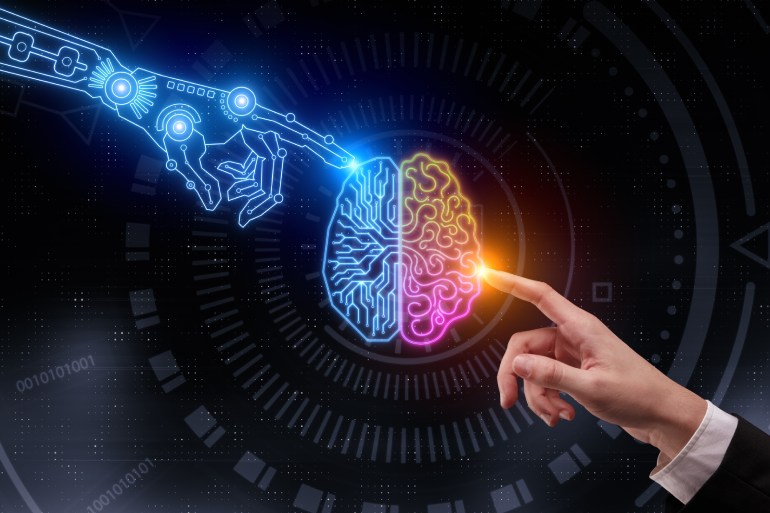 There is a hype around artificial intelligence (AI) for many years already and it has gotten another boost with the announcement of AI being able to write text on its own. How good such AI-written texts are and how the marketing industry can benefit from this technological innovation is, however, still questionable.
There is a hype around artificial intelligence (AI) for many years already and it has gotten another boost with the announcement of AI being able to write text on its own. How good such AI-written texts are and how the marketing industry can benefit from this technological innovation is, however, still questionable.
The fact is that AI can imitate human thinking to eventually be able to automatically take over tasks such as problem solving and decision making. A good example here is GPT-3, an intelligent language processing model launched by OpenAI in 2020, on which many copywriting tools are based. GPT-3 also uses machine learning (ML) and deep learning (DL) to train and learn. Machine learning is based on the concept that the machine can perform tasks without human instruction: it analyzes data, recognizes a pattern, learns from it and then applies that to new content, just like we learned theories in school and then applied them to new tasks. Deep learning is about the neural network of the machine, in other words “the brain”. GPT-3's “brain” is based on 175 million synapses, making it the largest computational linguistics transformer that comes closest to the human brain of any AI technology. The human brain is of course still vastly superior with 125 trillion synapses, but it can be expected that technology will continue catching up.
Artificial intelligence in marketing
Anyway, the use of AI in marketing is still in its infancy and not yet very widespread. That said, some companies are just figuring out what AI is all about and how it can benefit marketing, while others are implementing and testing. However, statistics show that the number of companies using AI is increasing. The reason for this is simply that higher profits can be achieved with it. Many experts predict that AI technology and the market around it will skyrocket in the next few years and those companies that ignore the trend will be left behind.
Copywriters know the problem of writer's block well and find it difficult to be creative every hour of the day. There is also the problem of time pressure, with strict deadlines to be met. Hence, with its many qualities and abilities, AI can be a boon to copywriters by helping them create diverse creative content at lightning speed. Not only does it create but also deliver success forecasts about the generated content.
In addition, the texts created are in general already very good, so A/B testing is no longer necessary, which in turn saves time and money. The future isn't in content generation, it's in content curation by helping the author make decisions and understand which of those millions of used words will work.
Intelligent machines vs. intelligent human
Of course, many are wondering if AI can replace humans, given that they are already writing like humans and are faster and more creative at the same time. “A robot wrote this entire article. Are you scared human?" is a well-known article written by an AI and published by the Guardian. The question is valid because, in fact, there are many copywriters who are worried about their job and afraid that a machine will take it over. Liam Porr's case also caused quite a stir because he used GPT-3 to write an entire blog.
Indeed, the AI is very smart and has many abilities similar to humans; however, we must not forget that AI has neither human emotions nor life experience nor human knowledge. It can only analyze data, extract facts, and produce a factual text or answer questions, but it can’t create emotions. This means that human copywriters are irreplaceable, and the AI only serves to help and support them. If you want, you won't have a blank sheet in front of you in the future. Copywriting can work as a team effort in the future, between the AI and the copywriter. AI will fill in the blank page and marketers will polish it, resulting in more effective advertising texts that strengthen brands in the long term.
A look into the AI future
AI technologies are developing faster and faster and many experts predict that the demand for them will increase immensely in the coming years. Even during the Corona pandemic, many companies noticed that AI is more important than ever, because they must create a connection to the customer with good advertising texts, since personal contact must be avoided. This is also confirmed by the numbers: 64% of marketing teams believe that language is more important than ever because of the corona pandemic. Other statistics also speak for the increased usage of AI technologies. According to Gartner, the number of companies implementing AI increased by 37% between 2015 and 2019, and that this year more than 30% of digital content will be created using AI.
Clearly, we have already arrived in the age of artificial intelligence without really being aware of it. The fact is that it will revolutionize, especially marketing. The question of when and how is up to the company because it all depends on whether they trust the AI to take over human tasks and are willing to let them participate in everyday company life.
By Daniela La Marca


